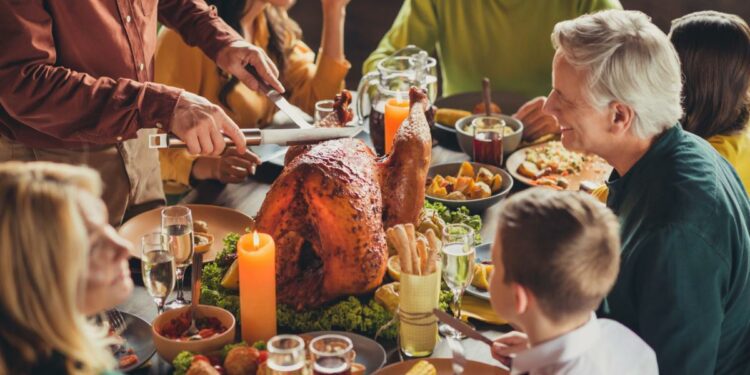The Nashville Farmers’ Market hosted a “Friendsgiving” celebration on Nov. 21 that drew dozens of residents and local business, civic and political leaders to come together as one community.
Presidential elections results were on the mind of several attendees and speakers, but so was the influx of neo-Nazi groups to the city over the summer, resulting in a confrontation between group members and the Metro Council.
The Metro Human Relations Commission, an arm of the Nashville-Davidson County Government, organized the Friendsgiving and launched a new campaign called “Humans Over Hate.” The inaugural dinner was named in honor of the late restaurateur Randy Rayburn, who died earlier this year and was influential in city and state politics while also being known for his hospitality.
“If one is hospitable, there’s no place for hate,” Human Relations Commission Executive Director Davie Tucker said to the gathering.
Tucker told me that night, and shared with the audience, that he was also concerned about marginalized groups hating others because of differences of opinion or acts of incivility. This was not just preaching to the choir, but rather finding a way to be present with diverse groups of people. And it’s not easy work.
Opinion: We can’t share our holiday meals. You voted to deport people who look like me.
Compromise, contradictions, disagreement part of USA’s DNA
The farmers’ market dinner was a meaningful part of the week after I returned from a trip to Memphis at the request of the University of Tennessee Health Science Center to speak to medical students about civil discourse.
I was last there for a similar talk in 2019 as part of The Tennessean’s Civility Tennessee campaign, which began just before Thanksgiving 2017.
The title of my talk on Nov. 20 was “How to Develop a Citizenship Mindset: The Evolution of Civility.” This is important because the term “civility,” while acceptable to some, can be off-putting to others who feel it is an excuse to silence dissent.
As I have written, however, the true origins of civility reside in the role of the citizen to uphold, challenge and sustain society.
Opinion alerts: Get columns from your favorite columnists + expert analysis on top issues, delivered straight to your device through the USA TODAY app. Don’t have the app? Download it for free from your app store.
The United States is a nation built on compromise, challenged with contradictions and hewn by disagreements that often get us to a better place in terms of expanding the rights of all citizens, not just some.
There are political pendulum swings and also opportunities to try again to build “a more perfect union,” to quote the preamble of the U.S. Constitution.
Seven tips to create a civil discourse and citizenship mindset
Over the years, in my research and interactions with people, I have collected nuggets of advice to help people achieve respectful discourse while maintaining their dignity.
Here are seven tips for fomenting civil discourse that I shared with the UTHSC medical students:
Create the right conditions
In person is better than social media
At the heart of all of it is a choice − to engage and set boundaries, to express one’s sense of agency and show empathy toward others and, most important, to be present.
The UTHSC students were especially interested in No. 2 and 5.
Organizing conversations among ideologically diverse people require transparency about ground rules and expectations, thus creating the right conditions.
Many different civic groups, including Braver Angels, practice methods to doing so by bringing ideologically diverse citizens together in conversation. Just like playing a board game or a sport, the rules are there to make sure the players are accountable to each other, and a moderator or a conversation leader can act like a referee.
No. 5 on disengaging is about recognizing that not every conversation will be successful, and that some space may be required before returning to the task.
On the other hand, sometimes, it also means moving on, especially to avoid harassment, bullying and insults. The goal is to aspire to be respectful, and, thankfully, in my experience, there are more people who are seeking this aim than not.
Self-care matters, so does practicing daily discipline of hope
What made the Humans Over Hate event so special was that it was local, full of neighbors and fellow residents committed to wanting to build a better place for all city residents.
I suggested to the students to start making progress within their own communities.
Opinion: That election conversation you’re dreading may be an act of love this holiday season
I know many people in my own circles who say they want to turn off the news completely or figuratively sleep through the next four years.
Taking breaks for one’s self-care is fully understandable. At the same time, our neighbors need us, and we need them.
We benefit from creating a daily discipline of hope, being present in the community, fighting bad policy or ideas, standing up for our rights, and listening to and supporting our neighbors.
Nurturing a democratic republic, and the layers from municipality to state to federal, requires regular maintenance ‒ not just a tuneup every four years during a presidential election.
As the holiday season continues, may you have many opportunities to build community.
David Plazas is the director of opinion and engagement for the USA TODAY Network Tennessee, where this column originally appeared.
You can read diverse opinions from our USA TODAY columnists and other writers on the Opinion front page, on X, formerly Twitter, @usatodayopinion and in our Opinion newsletter.
This article originally appeared on Nashville Tennessean: Include hope on your holiday menu | Opinion
Source link : http://www.bing.com/news/apiclick.aspx?ref=FexRss&aid=&tid=674b17b957404da69f208ae7c4b92d9c&url=https%3A%2F%2Fwww.yahoo.com%2Fnews%2Famerica-choice-holiday-season-hope-100636515.html&c=7777684289024501030&mkt=en-us
Author :
Publish date : 2024-11-29 21:06:00
Copyright for syndicated content belongs to the linked Source.






